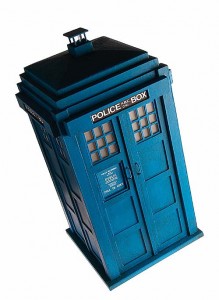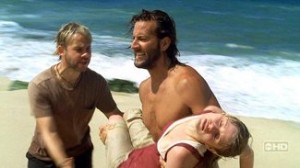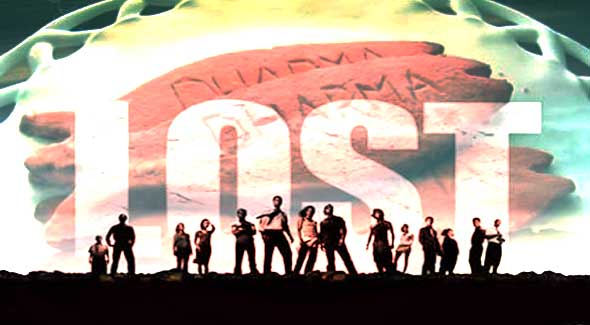Question 1: You’ve been talking a lot about character and political theory and literary allusions lately. Why don’t you ever talk about the weird shit that’s going down on the Island? The four-toed statue, the crazy purple light, the smoke monster, the way Walt’s mouth movements never seem to match what he’s saying. What the hell is going on here?!
Over the past few weeks I’ve gotten this question or comment several times. There seems to be an insistence that my posts, while interesting curiosities, are focusing on the wrong things. That I am, as it were, missing the point. Maybe. But I think the fault is not mine alone. It is also the fault of the show.
It is my fault in that my mind tends to naturally head in the direction of political theory, literary theory, philosophy, and the like. You can look back at my other posts on other topics if you need proof of that. (Except this one.) But the show is at fault, as well. In order for me to overthink something (rather than “regular-think” it), I need information. I need to be able to understand the plot on a literal level before I can dig deep and get at the themes, the inconsistencies, the references, and so on. I haven’t yet tried to overthink the magical elements on the Island simply because I still don’t know what the hell they are. That’s the show’s fault.
That said, I can certainly try to regular-think the mythological stuff! Using my powers of deduction and cracked-out imagination, I shall attempt to figure out what is going on on this Island. My theories will likely be ridiculous and incorrect, but I am hoping you will find them an amusing diversion from your work.
So here’s my theory: time travel. Episode 3.8 was the first to point out time travel as a legitimate answer to all of these mysteries. Maybe the question isn’t “where is the island?” but “WHEN is the island?” I think Hurley made a joke along these lines at some point in the second season—just like Sawyer made a joke about the aliens. I’m willing to take both these jokes seriously.

How the first members of the Dharma Initiative got to the Island.
My theory is that the Island is located smack dab in the middle of some space-time anomaly, so that it actually exists in the distant past. The burst of electromagnetism that came out of the Island when Desmond failed to push the button several months ago pulled Oceanic Flight 815 into the anomaly. So where is the Island? Maybe it’s in the distant, distant past. Like, say, the prehistoric past.
Remember that the Dharma dude on the film strip never said, “push the button or the world blows up.” He just says it is “of utmost importance” that the button is pushed. That is quite different. So here’s my theory. It’s the 2001: A Space Odyssey theory. 1960’s SPOILER ALERT: In 2001: A Space Odyssey, an alien precursor race left creepy monoliths on and around Earth to evolutionarily bootstrap humans, thus bringing our species to more advanced stages of evolutionary development. For instance, at the beginning of the film, a bunch of apes find the monolith and immediately learn to use tools and weapons.

Desmond!
So let’s imagine the whole Island is a 2001-esque monolith. The Island’s weird electromagnetic properties bring species to new levels of development. Some weird four-toed aliens dropped the Island onto Earth to give humans sentience. They also transported a small contingent of humans there to protect the Island and make sure it remained working properly in the prehistoric past so prehistoric humans would remain on the right evolutionary path. That small contingent of people—who live in a time bubble in the distant past but have links to the outside world and the future—eventually named themselves the Dharma Initiative.
But the Dharma Initiative got greedy. They decided they wanted to see what happened if humans who were already sentient—20th century humans—were brought to the Island. This was The Incident–and for some reason it freed The Monster. But what happened to the 20th century people who were brought to the Island? Well, some of them moved up the evolutionary ladder. They developed psychic powers. This is how Walt was able to project himself around the jungle, and how Locke was able to “speak with the Island.” Now that Desmond turned the failsafe key, he got those powers, too.
The question is, what are they planning to do with these “special” psychic people? Does Ben Linus have some evil scheme up his sleeves? Maybe a scheme to bring down my imaginary aliens, possibly with an army of genetically-altered polar bears, and break into alien Heaven with all the “good” people on his list? I sure hope so.
And that’s my crack theory. Stupid, yes. Ridiculous, yes. But wrong? …Actually, probably yes. And don’t ask me why Locke’s legs started working again, and why Rose’s cancer went away. I have no freaking idea.

Eko was killed, because the actor, AAA, didn’t want to live in Hawaii anymore (the same reason applies to a dozen other killed characters as well). Darlton had however planned a central 4 season story arc for him, but unfortunately they had to kill him and change their plans.
I really hated when Eko died because it rendered the entire tail section arc from the previous season as a complicated way to kill Shannon. You’re almost through the low-point. Ep 14 is the end.
God, I was so pissed when Eko died. The man proves himself to be the baddest man on the Island, stares down the monster, and then when it shows up again? He just goes down. I wanted him to go down fighting. Better yet, I wanted some kind of divine implication that Eko knew exactly what the monster was. Although shape-changer monster Yemi scared the poo out of me.
I’m consistently impressed on your overthinking. These posts seriously keep me entertained on otherwise dreary Mondays!
I really like your bringing up the good and evil aspect found in this show; I’ve always thought it was one of the central elements, ever since that scene in Season 1 where Locke plays Backgammon with Walt.
Anyway, I don’t want to post too much because the last thing I want to do is spoil this amazing show for you, but I’m counting down the weeks until you’re caught up and the theorizing about season 6 can begin!
See why Des is one of my favorite now? And he only gets better.
And yeah, Eko was killed because the actor wanted off- the rushed need to get rid of him, I think, as I have said before, had a big influence on how dissatisfying his demise was. Yes, we got lots of character insight through the flashbacks in the episode, but there could- and should- have been more; and the way the Monster suddenly grabs him and stuff… Le sigh.
Sayid is an intersting nut to crack now, too. He saw the ghost-ee Walt with Shannon, right? So why is he so skeptical when Locke tells him about Smokey?
What do you think of Juliet?
The change in quality of the show that people have been alluding to (which takes place about two thirds of the way through season 3) is directly related to the unprecedented deal the producers struck with the network, locking in the show’s 2010 end date.
Oh, and you can just call the mini-island “Hydra Island.” Which is an awesome name for an island.
Lost’s most solid and well constructed story line is that of John Locke. What you’re seeing now is a bit of rattling of faith. Contrast the Locke from S1 to what you see now.
As far as your take on the mythology, you are thinking in the right terms. The show leans heavier on the mysteries in the later seasons so its good to think about it now.
I’m gonna have to start making a list of all the “hit the nail on the head” parts of these blogs. I’ve never read a lost blog of someone viewing it for the first time, it’s weird, it seems like the overall themes or motifs/parallels are easier to spot or more obvious when people watch it on DVD or when the eps are watched straight through instead of once a week. Some of the themes that took me ages to see, you’ve picked up seemingly straight away! I’ve noticed this with a few people I’ve shown the series to (on DVD) as well.
I think I just fell in love with you. Not only did you refute compatibilism in some swift blow, but you referenced a line from the South Park movie that constantly runs through my head.
I disagree with you on one point though. I don’t think Eko believed in fate. He believed in, as you said, doing the best in the situation you are given. In relevance to the button, the best he could do was push the button. It had a purpose. He wanted a purposeful life. Logic dictated he should push the button. (That syllogism assumes the premise of the button had a purpose is true).
The key Eko quote is “Do not mistake coincidence for fate.” For the first time, I think the writers tipped their hands as to how they feel about religion.
Wow.. A theory combining my all-time favorite TV show with my all-time favorite movie! I find it hard to believe that this 2001 theory of yours is correct, but nevertheless, I like it!
And now that you mention it, your answer to the first question made me think about another great story. This time a book – well, a series of books, really.
“Does Ben Linus have some evil scheme up his sleeves? Maybe a scheme to bring down my imaginary aliens…”, “And don’t ask me why Locke’s legs started working again, and why Rose’s cancer went away. I have no freaking idea.”
These lines made me think about the Riverworld series written by Philip José Farmer. Without spoiling too much, in case you haven’t read it, the book is about purgatory (huh?), and a man’s quest to find out who’s behind it. I had previously seen many parallells between Lost and the Riverworld series, but these two lines of yours are quite spot-on! If you haven’t read it, you really must do so!
Thanks again for brilliant overthinking! Like many others have said I can’t wait to see your theories on season 5!
The writers did not kill Eko because of the actor’s wishes. They just sped up his demise and compacted his story into a few centrics. And most people agree it was only the “mini-season” of the first 6 episodes that seemed to drag a bit. I think it gets moving very fast with episode 7 and episode 8 (Flashes Before Your Eyes) is one of my favorites from the season. I don’t know what some people are talking about with it only getting good at 14.
And yes, it really is an historic event to lock in the end date of a TV show regardless of ratings. Stuff gets so much more focused after they locked it in about 2/3 of the way through season 3.
@Eric, “The writers did not kill Eko because of the actor’s wishes.”
Well Damon Lindelof would disagree, he specifically said on ComicsOnComics interview (beware, he explains what the Numbers mean in that interview, it’s the same explanation as in the ARG, he also says that the Numbers won’t be explained in Season 6 so it should be safe to watch it, but it might contain other spoilers too) that they had planned a 4 season story arc for Eko (he was supposed to play the part that Locke is playing now at Season 5 end according to some people), but they had do kill him the way they did, because AAA didn’t want to live in Hawaii anymore. And they had to kill other people on the show as well for the same reason. Watch it and then come back.
> I think it gets moving very fast with episode 7 and episode 8 (Flashes Before Your Eyes) is one of my favorites from the season. I don’t know what some people are talking about with it only getting good at 14.
If you had to pick an absolute low-point for the series as a whole, it’s the last 1/4th of season 2 (minus the finale) through the “Expose” episode in season 3. And the six-episode “mini-season” was the worst idea they ever had.
“And the six-episode “mini-season” was the worst idea they ever had.”
I have to say, in their defense, that LOST fans are some of the pickiest SOBs in fandom. (I should know — I’m one of them!) The “mini-season” wasn’t just something they did because they thought it would be fun, or make for better storytelling — there were so many viewer complaints about ABC’s scheduling in Seasons 1 and 2 (a few new episodes, followed by a few repeats, so they had time to shoot a complete season over the year) that they thought they’d do the next best thing: show a chunk of episodes uninterrupted, take a hiatus while they continued shooting, then show the rest of the season uninterrupted. And then the fans complained about THAT… which is why we get the show from February-May now rather than over the full TV season. No one wanted the repeats.
Same for Nikki and Paulo — fans whined that there were more passengers who survived the crash than just the leads, so why weren’t they getting any screen time on the beach? So they bring in those two, and the fans whine that they’re introducing new survivors “out of nowhere.” When in reality, the rest of the passengers were never supposed to be all that relevant to the storyline in the first place, and they should have just kept doing what they’d been doing well and not listened.
(I happen to really like “Expose” as a standalone episode, and it’s a great way of answering the critics of those characters)
Kevin — I meant “they” more as the whole producers/network/whomever combined. As soon as 24 took the cue from HBO and started running uninterrupted seasons, it changed the way serial shows operate. With the six episode mini-season, fans had nothing to do but pick those episodes apart for 3 MONTHS. The episodes weren’t strong enough on their own to hold up to that kind of review.
And I agree that Expose is a fantastic stand-alone episode outside the storyline.
Agreed, Tom. From my understanding, the producers were caught between a rock and a hard place — ABC wanted a full season (i.e., 22 episodes over nine months) since it was one of their most popular shows, so the creatives came up with a compromise… which made no one happy.
All in all, uninterrupted seasons are great… as long as there’s something just as good in the off-months. With HBO that hasn’t been a problem; not so much with ABC…
@Tom and Kevin: Not arguing with either, just elaborating. I think one of the reasons why the “team” didn’t succeed at the mini-season is how it was so out of their normal format. Specifically the writers. They’re great at writing overarching plots, but when they got out of their comfort zone and into stand-alone format, it showed. This made it easier for the episodes to be picked apart during those three months, etc., tie in the other reasons.
Hello,
Long time reader, first time poster etc etc.
I just felt I had to pipe in here (without getting too spoilerish) to say you’ve re-ignited my interest in the show. I have watched it all, but from about late season 3/mid season 4 got the feeling they were marking time and making it up as they go along, but looking at some of your more recent speculations I’m surprised to see that there are through-lines that I hadn’t picked up on and can only see with hindsight and your comments how far back some of them went.
When you catch up I’d love to read your own thoughs on where you can see things working though, and I’d also like your opinion of the “wheels within wheels” way some of the series works. (That’s not intended to be a spoiler and, as far as I know had no reference to the show – just a term I’ve used for discussing it with friends about how things “layer up” for want of a better expression.)
I think the mini-season worked well in that it allowed the writers to focus on the Sawyer-Jack-Kate love triangle, which doesn’t seem to fit in very well with a lot of the other plots/themes. I do remember that waiting so long for more lost was agonizing, though.
@ Eric: I totally agree that locking in the end date was a historic event. The open-ended television format tends to hamper good writing; the producers made the right choice here.